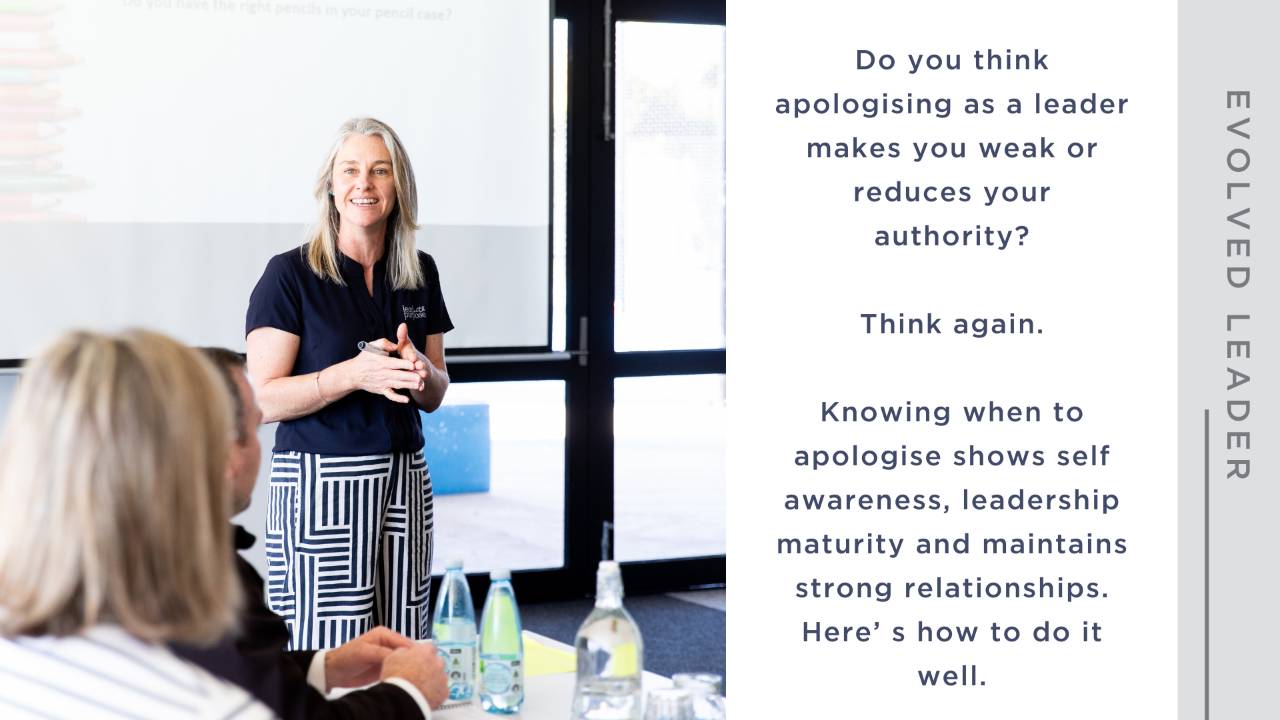The Power of an Apology
Jan 30, 2025
Yesterday (at the time of writing) I apologised.
I must admit it had been a while. But the recollection of the moment I wasn’t at my best warranted an apology. How did I know? The moment clung to me, sitting in my thoughts, knowing in that minute I wasn’t at my best. Yes I had recovered my composure (as my colleague kindly put it) quite quickly and continued on in the meeting, but I knew that my reaction in that moment wasn’t how I wanted it to be and to be able to continue to have open dialogue with that person, I needed to share that I was aware that my reaction didn’t align with creating a safe, inclusive space where people are encouraged to speak up. So, I apologised.
It made me think, why don’t we apologise more often?
Is it because we don’t have the self-awareness to know that a moment warrants it? Is it because we just expect people to get over it and we move on, and tell ourselves it doesn’t really matter? Or is it that we are afraid it will cost us something if we concede that we are not as good as we want to be?
The Power of a Well-Timed Apology
Apologising can be interpreted as weak or needing to address a moment when we failed. Did we really? Our ability to offer a genuine apology is one of the strongest indicators of our self-awareness, emotional intelligence, and leadership maturity.
I’m not suggesting we offer an “I’m sorry” every time we say something someone doesn’t like or want to hear. What I am saying is, knowing when to apologise indicates our ability to be self-aware and know what impact we are having on others and the environment around us. It’s about knowing when to apologise, why it matters, and how to do it in a way that builds trust rather than erodes our confidence.
What are your beliefs around apologising?
Many of us can hesitate to apologise because of our deep-seated beliefs about what it means:
- Fear of looking weak – the worry that admitting a mistake will diminish our authority.
- Avoiding discomfort – Apologising means acknowledging harm done, which can feel confronting.
- Perfectionism – When we hold ourselves to impossibly high standards, we can struggle to accept we got it wrong.
- Unawareness of impact – Sometimes we simply don’t realise the effect our actions have on others.
- Ego – need I say more.
Yet, failing to apologise when it’s needed can lead to resentment, disengagement, and a breakdown of trust in working relationships.
Apologising as a Sign of Self-Awareness
Apologising well is a leadership skill that reflects a high level of self-awareness. Leaders who can recognise when their actions or decisions have negatively impacted others, acknowledge their part in a situation without excessive self-blame or understand that apologising is about repairing trust, not diminishing authority. These leaders are more likely to build strong, loyal teams. When we model accountability, we encourage a culture where mistakes are acknowledged and learned from, rather than hidden or denied.
It's important to remember not every situation requires an apology, and over-apologising can be just as damaging as avoiding it.
If you recognise a moment that warrants an apology, you can do it whilst both improving relationships and building authority. Here’s some tips:
- Acknowledge clearly what happened and its impact on individuals or the team,
- Take responsibility, share what would you have done differently or the learning you gained,
- Express a genuine apology,
- Commit to what you will do differently next time.
Apologising is not about admitting incompetence—it’s about demonstrating accountability. Leaders who can own their mistakes without diminishing themselves set a powerful example for their teams.
So, next time you find yourself hesitating or avoiding an apology, ask:
- Am I avoiding this because of pride, fear, or discomfort?
- Would an apology help to rebuild trust and move things forward?
- How can I apologise in a way that aligns my actions with my words?
A well-placed apology doesn’t make you less of a leader, it makes you a better one.
Get Evolved Leader delivered to your inbox every week to receive effective tools and practical ideas you can implement to develop your own leadership skills and style as well as those in your team.
We hate SPAM. We will never sell your information, for any reason.


